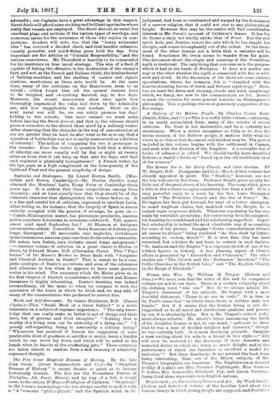Sophocles and Shakespere. By Lionel Horton Smith. (Mac- millan and
Bowes, Cambridge.)—Mr. Horton Smith's essay obtained the Members' Latin Essay Prize at Cambridge three years ago. It is seldom that these compositions emerge from obscurity ; and at least equally rare that they should be of the elaborate character that distinguishes the volume before us. It is a fine and careful bit of criticism, expressed in excellent Latin. After telling us, for instance, that the tragedy of Spain is almost entirely occupied with the passion of revenge, he goes on :— " Contra Shakesperius nester, hac plerumque praeterita, amorem potius suavitate dulcissima in aeternum celebravit. Tali, quaeso, amori quid spud Sophoclem loci ? At Haemon et Antigone amore mutuo ardent. Conceditor. Sed a Romeone et Julieta quam lenge discrepant ! Hi necessariis suis neglectis, civitatisque ipsius immemores, amorem quasi iure freti divine solum venerantur. 111i autem iura fratris, iura civitatis amori lenge anteponunt." —Another volume of criticism on a great classic is Studies in Dante, by Edward Moore, D.D. (Clarendon Press). This "First Series" of Dr. Moore's Studies in Dante deals with "Scripture and Classical Authors in Dante." This is meant to be a com- plete catalogue of Dante's quotations, and even of the references and allusions in him when he appears to have some previous writer in his mind. The summary which Dr. Moore gives us in his first chapter of Dante's acquaintance with Greek and Roman literature is highly interesting. Dante's learning was indeed extraordinary, all the more so when we compare it with the ignorance of the times in which he lived, and, we may add, of many of the commentators who professed to oorrect him.


































 Previous page
Previous page